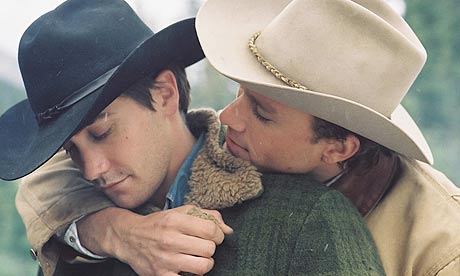
Italians tuning in to their state TV network this week had a rare chance to see Brokeback Mountain, the tale of true friendship between two straight cowboys.
At least that was the version of Ang Lee's gay cowboy Oscar-winner broadcast by channel Rai Due. Two love scenes between the male protagonists had been excised, provoking furious accusations from gay-rights groups of censorship driven by creeping homophobia in Italy.
"The need to change a film about homosexual love into a film about simple male friendship says a lot about the current cultural climate," said Franco Grillini, president of Gaynet.
The cuts - involving a kiss between actors Heath Ledger and Jake Gyllenhaal and a love scene in a tent - came days after the Vatican attacked an EU proposal for the UN to formally condemn discrimination against gay people.
Rai on Tuesday claimed the cuts were an honest mistake and promised to broadcast the full version of the 2005 film. In a statement, the network explained that it had asked Italian distributor Bim for a copy suitable for broadcast before the watershed. As the film had only been certified for viewers over the age of 14 in Italian cinemas, Bim went back to Italian censors for a new cut, which it then supplied to Rai. The mistake, said the network, was that programmers decided to air it after the watershed, "without checking" first which version it was.
"Since it went out after the watershed we could have shown the full version," said Rai's director general, Claudio Cappon. "This has nothing to do with censorship."
But opposition senator Luigi Vimercati called the explanation "embarrassing" and said he would demand a parliamentary inquiry.
Critics noted that while the gay love scenes were removed, censors left a heterosexual sex scene in Monday night's version. "Evidently it is not sex which creates fear and pain, but the feelings between two men," said Grillini.
Yesterday, Italy's newspapers picked over the Brokeback story, with La Stampa asking "Who stole the gay kiss?", while Il Giornale, the newspaper owned by the family of prime minister Silvio Berlusconi, dismissed the protest as the work of "the politically correct lobby".
Political parties consider channels at Rai as private bailiwicks, controlling content. The network has effectively barred anti-Berlusconi comedian Sabina Guzzanti and can be relied on for a diet of dancing girls and biopics of popes.
Gay rights association Arcigay countered that the trimming of the film came amid a rise in violence against gay people in Italy, marked by an increase in the murders of transsexuals. "The resistance by politicians of all stripes, backed by the Vatican, to same-sex unions has created the basis for the climate of hostility," said a spokesman, Matteo Ricci.
Italy's viewers may think differently. Vladimir Luxuria, a transsexual former MP, was last month voted by viewers the winner of L'Isola dei Famosi, a reality show broadcast on Rai Due. Luxuria said yesterday that Rai's explanation for the censored film was believable, but added that the version aired was like "the Mona Lisa without a head".
Cruel cuts Scenes that upset the censor
Flesh and the Devil 1926
The British Board of Film Classification decided in 1927 that 23 minutes of Greta Garbo at her most seductive had to be cut from this silent classic.
Casablanca 1942
The censor changed the entire story
by cutting out key episodes showing the romantic relationship between
the married Ilsa (Ingrid Bergman) and
Rick (Humphrey Bogart) in prewar Paris, because they were considered adulterous.
The Devils 1971
In a rare example of a film being censored not only by the BBFC but also by its own distributor, director Ken Russell toned down or removed objectional scenes of sex and violence, including a sequence in which a group of nuns cavort on a crucifix.
Straw Dogs 1971
Rape scenes in Sam Peckinpah's film were accepted by the censor board except where the victim appeared to enjoy the assault.
Lara Croft, Tomb Raider 2001
Scenes involving knives with overt glamorisation, were reduced. A head-butt was also replaced by an indistinct punch, due to the considered danger of imitation among the teenage audience.
Lilo and Stitch 2002
The BBFC were concerned about children copying a scene in which Lilo hid in a washing machine, and Disney agreed to replace it with a cupboard as Lilo's hiding place.
Caroline White

